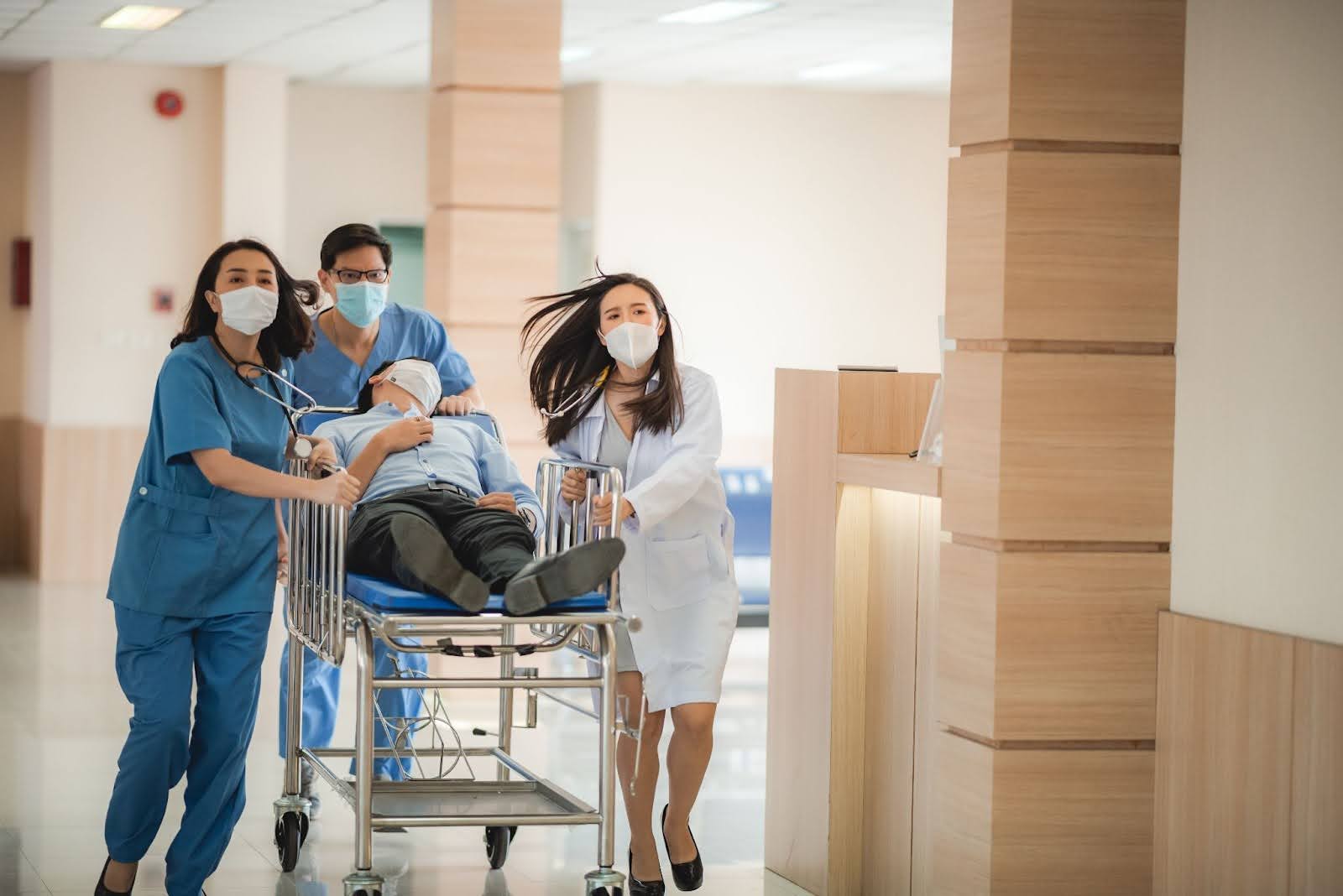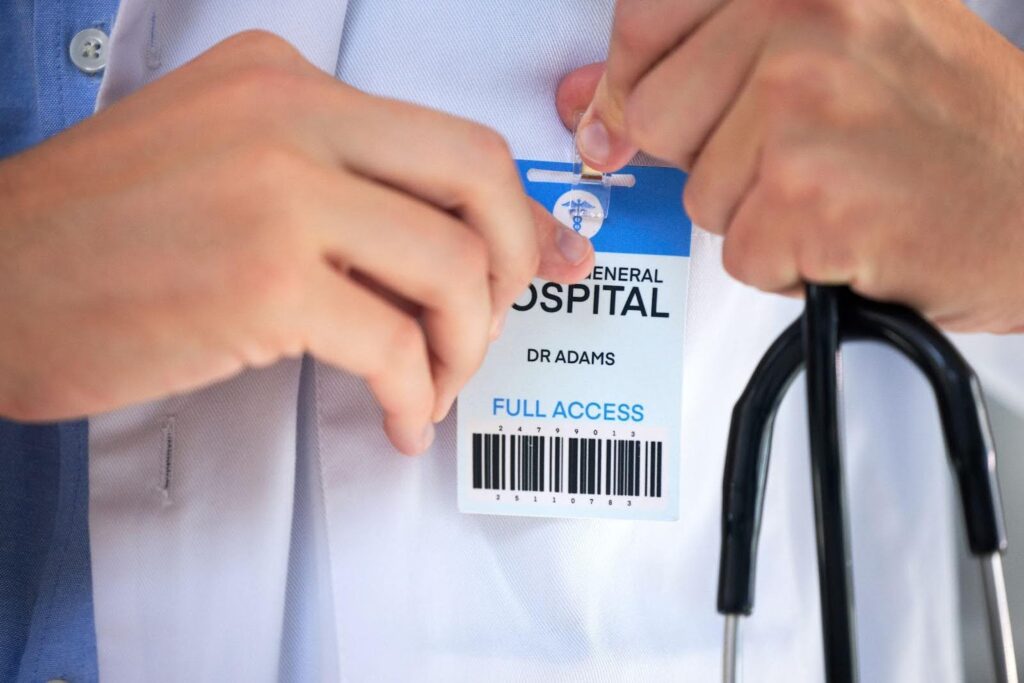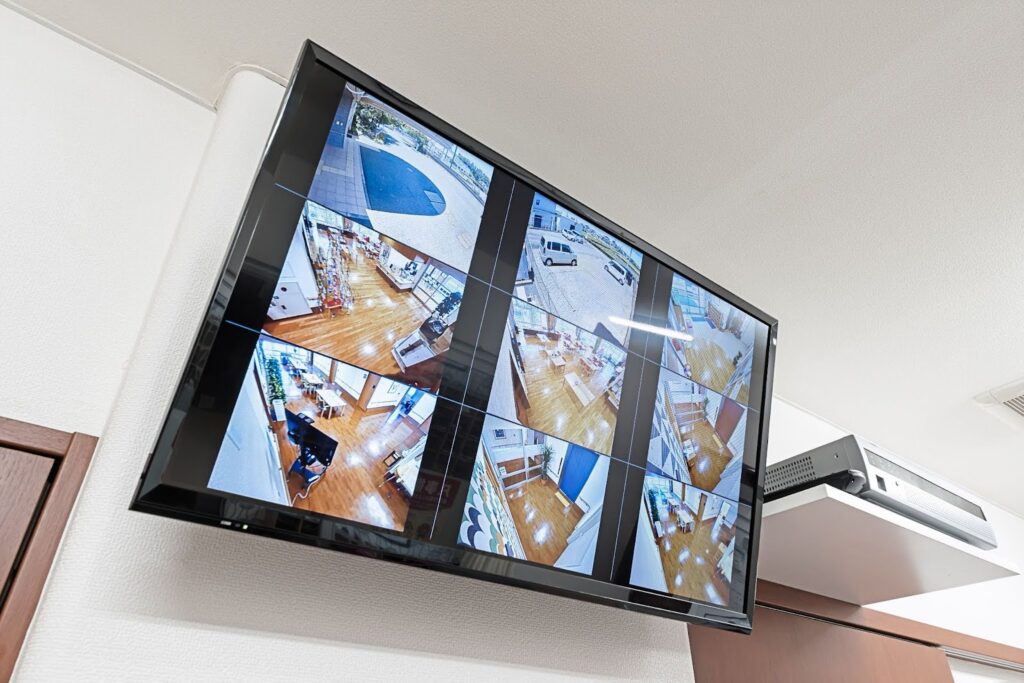
Hospital Security Best Practices
Hospitals and healthcare facilities face security risks unlike any other industry. The concern is so great that in 2016, the American Hospital Association created the Hospital Against Violence (HAV) initiative to improve hospital security, reduce violence, and make medical centers a safer place to work.
Some of the more unusual threats to hospitals include drug thefts, cybersecurity attacks, workplace violence, and even infant abductions. It’s more important than ever that hospitals take proactive steps to prevent these security breaches before they occur.
Hospital owners and managers can implement a variety of security measures to ensure their facility is a safe place for patients, staff, and visitors alike.
Here’s how to make your hospital as secure as possible.
1. Hospital Security: Understanding the Risks
2. Control Access for Better Security in Hospitals
3. Install and Monitor Security Cameras
4. Install Panic Buttons for Your Hospital
5. Set Up a Security Communications Hub
6. Protect Against Cybersecurity Threats
7. Protect Your Hospital with a Private Security Service
Hospital Security: Understanding the Risks
While all businesses face security risks, healthcare facilities must take greater precautions than most to ensure the health and safety of their employees, patients, and visitors. Plus, hospitals work with hazardous materials that could lead to fires, necessitating fire watch security.
Hospitals are not only high-traffic facilities, they’re also hectic and fast paced. Patients arrive at all hours of the day and night while visitors come and go.
Because of the constant influx of people, the hospital’s security operations must be top-notch and its staff members must stay vigilant. Otherwise, there may be an increased risk for:
- Trespassing
- Vandalism
- Theft
- Cybersecurity threats
- Violence
Every business property carries a risk for trespassing and vandalism. As United States laws concerning reproductive rights change across different states, it’s expected that some medical facilities could see an increase in protests as well as an increased risk for violent threats.
Theft is another concern. Inside their facilities, hospitals carry a risk of theft of everything from equipment and prescription medications to patient’s personal property and infants in the maternity ward. In hospital parking lots and parking garages, there’s always the potential for automobile thefts or vandalism.
Cybersecurity threats to health data can jeopardize patient privacy. Unauthorized medical staff, patients, or visitors could gain inappropriate access to computer systems from anywhere within the building.
There’s also the potential for violence against staff or patients. This could arise from visitors, staff, other patients, or criminals who view hospitals as soft targets.
Given these common risks to hospital security, medical facilities should take steps to enforce rigorous security programs that ensure the safety of the building and its occupants. We outline these steps below.
You Might Like: The Pros and Cons of Hiring an Unarmed vs. Armed Security Guard
Control Access for Better Security in Hospitals
Hospitals and medical centers of all sizes require multiple levels of access control. That means having full awareness and control over who enters the facility, as well as where people are authorized to go once they’re inside. Facilities must establish several access points throughout the property. Each one should be connected to an alarm system that will trigger in the event of a security breach.
Here are four ways to control access into and within a hospital facility.
Visitor Management System
Every medical center should have a visitor management system. These are limited entry points with security desks where patients and visitors can check in. Visitor management systems also include full-time hospital security officers who can grant or deny access.
Guards at security desks should first identify the purpose of the person’s visit, such as receiving medical care or visiting a patient. They should then check the visitor’s identification and provide them with a visitor pass that identifies them as non-personnel.
Often, this basic security measure is all it takes to deter undesirable visitors. Most people will not produce photo identification if they are planning to do something wrong. They’re also less likely to do harm if they see a healthcare security officer on the premises.
A strong visitor management system can also include screening devices, such as metal detectors with bag scanning technology that can identify firearms and other weapons.
Hospital Staff Access
Hospitals should supply their staff with access cards that they must swipe to enter a restricted door. Biometric security methods, such as fingerprint or facial recognition locks, can provide an even tighter level of security.
Keep in mind that the key cards given to employees should not unlock every single door in the facility. Not everyone who works in the hospital needs or should have access to every area.
Some of the areas where you should restrict staff members from entering include:
- Surgical centers and operating rooms
- Maternity wards and infant nurseries
- ICUs
- Pharmacies and areas used for drug storage
- Administrative offices that store or offer access to physical or electronic medical records
Patient Access
Patients can sometimes pose a threat to themselves or others. For healthcare professionals and security staff monitoring psychiatric patients, this can be a huge concern, especially if a patient tries to leave their room to wander to a different floor.
For high-risk patients, consider supplying patient monitoring technology, such as bracelets. These will alert staff if the patient attempts to open a door or access an elevator.
Lockdown Capability for Staff and Patient Security
Your facility’s access control system should include a lockdown capability to limit access to specific sectors of the hospital. Should security or staff identify an active threat, they can prevent suspects from breaching other areas of the facility by remotely disabling the doors that lead in and out of the area.
Read About: Everything You Need to Know About Glass Break Sensors
Install and Monitor Security Cameras
Video surveillance systems are a must for hospitals. Not only are they one of the most efficient ways to prevent and detect criminal activity, they’re also essential to solving any crimes that have already happened.
Depending on the facility’s size, you may need dozens or even hundreds of cameras to survey the entire property. At a minimum, place video cameras throughout the hospital in the following key locations:
- High traffic areas such as lobbies, waiting rooms, and cafeterias
- Remote areas
- All areas where visitors are allowed, including elevators, stairs, and hallways
- All entry and exit points
- All perimeter entry points, including parking garages, parking lots, and campus entrance points
- All restricted-access areas, including infant nurseries, ICUs, and ORs
- Anywhere drugs are stored
- Loading docks and delivery areas
- Heliports
- Ambulance bays
- Anywhere medical records are stored
When installing new cameras around the hospital exterior, consider thermal cameras. Thermal cameras make it easier to detect motion in dark or low-light areas.
Make it a priority to schedule regular maintenance and updates to your security cameras and CCTV systems. Security cameras are only useful when they’re in optimal working condition.
Learn about other specialized security services:
Manufacturing plant security | celebrity security guards | yacht security | movie set security | event security | fire watch security | bank security | movie theatre security
Install Panic Buttons for Your Hospital
Panic buttons are a quick and effective way to alert on-site security professionals, local police officers, and other law enforcement agencies that you need immediate emergency help.
Many hospitals have panic buttons installed at ER entrances, hospital pharmacies, and reception desks. Some medical centers take this a step further and provide wearable panic buttons to their employees.
Set Up a Security Communications Hub
Most hospital campuses consist of several buildings spread over a large property. These buildings include separate inpatient and outpatient medical facilities, diagnostic testing centers, and administrative offices.
The bigger the facility, the more vital the need for a central communications hub or security department. It’s best to have a single group of trained personnel who can constantly monitor all activity throughout the campus. It also allows security personnel to communicate data breaches and enact response plans in real time.
A hospital’s central communications hub should include security consoles where personnel can monitor video surveillance cameras 24/7.
Protect Against Cybersecurity Threats
Cybersecurity is an ever-present risk to infrastructure, and hospitals must take all precautions to protect their data. That requires you to have up-to-date cybersecurity measures in place.
The protection of patient privacy, especially medical records, is a constant source of worry for medical facilities. Hospitals must also safeguard their proprietary and financial data, as well as protect against cyber attacks that could disrupt the facility’s infrastructure or attempt to extort money.
Some criminals deploy cyberattacks to shut down a hospital’s electrical power or computer systems. This can put patients in immediate harm. Communities rely on hospitals to function without interruption, which means that a successful cyberattack is a fast way to damage the trust that a community puts in their local hospital.
All hospitals should make excellent cybersecurity protections their priority.
Protect Your Hospital with a Private Security Service
Healthcare workers do life-saving work and deserve to work in a secure environment. Likewise, patients should feel they’re being cared for in a safe and comfortable environment. The best way to foster a safe environment is to hire a private security company.
Private security teams offer a wide range of security solutions that go well beyond what most medical facilities are capable of handling on their own.
Security Risk Assessment for Hospitals
When you hire a private security company, the first thing they’ll do is send security experts to visit your site for a full risk assessment. This is how they identify any and all weak security points within the property.
They’ll map the entire campus and determine where security efforts are already solid, where they’re missing, and where they need enhancements.
Emergency Response Plan
A private security firm will develop an effective emergency response plan for your hospital to follow in the event of a security breach.
After developing the plan, they’ll train hospital staff members about proper response procedures. This includes how to respond to specific threats like active shooters or infant abductions.
Physical Protection
One of the best ways to create a safe and secure hospital environment is to position hospital security guards throughout the facility. Visible, uniformed guards are an excellent crime deterrent.
Professional security guards undergo training in de-escalation techniques and know how to diffuse a threat before it becomes out of control. When you hire a private security company to staff your facility, you can rest assured that you have more than one set of eyes keeping watch.
Different security guards may have training in different skills and roles, such as front desk security, exterior security, and monitoring video surveillance systems. The key is to have experts on hand at all times who know how to handle a variety of security posts and situations.
Periodic Penetration Tests
From time to time, private security companies will conduct penetration tests. Penetration tests analyze the security protocols and systems in place to ensure that everything is secured as intended and that no new weak spots have surfaced.
If weak points or vulnerable areas are detected, they’ll put new measures in place to avoid security breaches and better protect those areas of the facility.
Given the risk of everything from pharmaceutical drug thefts to cybersecurity data breaches, hospital security is not something to take for granted.
A private security company can identify, prevent, and manage the risks. That means your hospital becomes a safer and more secure place for medical professionals, visitors, and all members of your hospital staff.
To find a professional security company to protect your hospital, visit Security Explorer now.
Up Next: 43 Shocking U.S. Burglary Statistics








